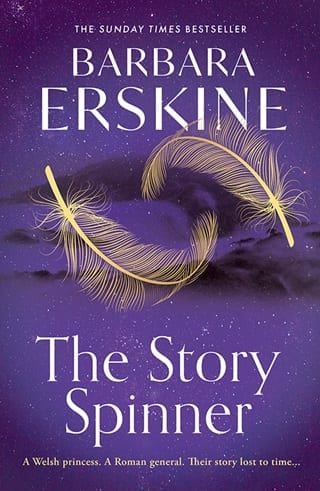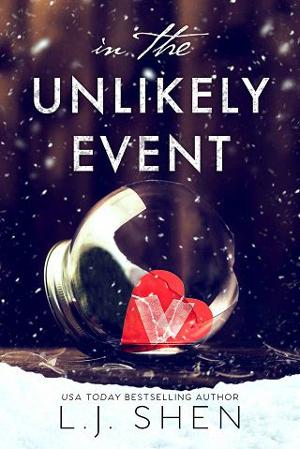21
At breakfast next day Cadi glanced through the scribbled pages with an exclamation of disgust. ‘It's happened again. I've read most of this in my history books. I'm repeating what I already know of Macsen's career.' She had made scrambled eggs for them both, the eggs from Dai Prosser's farm, mixed with parsley and dill from her own garden. Meryn was in charge of making the toast– bread he had fetched still warm from the mill. After he put a slice on each plate he reached over and pulled her notepad towards him. ‘This is always a risk,' he said. ‘You're running your research in tandem with the automatic writing. Resist reading any more background stuff, Cadi. Trust your pen. And, next time, I want you to do something for me. When you're in the writing mood, I want you to focus on Branwen. According to you, she didn't go with them. She belonged round here, her people came from that great hill fort that looms over there above our meadow. She is a local and it's her story we want. We want to know what happened here when the armies of Rome rallied round Macsen's standard and left the country unguarded. Even I remember enough of the history of this country to know Macsen was partly blamed by historians for leaving Britain open to the attack of barbarian hordes. It was the dawn in Britain of what became known as the Dark Ages.'
‘But the Roman armies left in AD 410. I remember that date from school.' Cadi put the coffee pot on the table and sat down opposite him. ‘They needed all the legions back in Rome to save the city from the invading Hun. Macsen took his army away in the year 383.'
‘So we want to know what happened in the intervening years and Branwen will tell us.'
‘But we know what happened to Macsen—'
‘No!' Meryn held up his hand. ‘I don't want to know what Wikipedia says. Nor history from books. Forget what you have read. The people on that hill fort didn't know what was going to happen. All they knew was that the legions had marched away, and yes, presumably you're right, Elen went with them and her children with her. And presumably it's a historical fact that, as you say here, they met up with Bishop Martin of Tours who would not have been canonised in his lifetime but later became known as St Martin. And presumably you're right, Macsen gave up worship of the soldiers' god, Mithras, to follow Jesus Christ though that sounds a bit odd to me, to be honest, if he was a true initiate, but he might have just been a realistic soldier who went with the perceived flow, which was towards Chris-tianity by that time in history. We can check that with your books later if we need to, which we will if you ever decide to publish all this stuff and you need to appease Arwel. But who was left behind? Who lived in the palace at Camp Meadow? Did the invading Irish pirates come back and burn it to the ground? Did the -Saxons appear at that date? Were they held at bay, or was this the beginning of the age that turned Albion dark?'
‘And you think Branwen will know all this?'
‘She seems to be an intelligent woman, educated, strong.'
‘You really are very interested in Druids.'
‘I met one, don't forget,' he said grimly. ‘And I'm often described as one myself.' He pushed away the notebook and reached for the coffee pot. ‘In history– that is, the recorded opinion of Romans and Greeks– Druids were educated, phil-osophers, politicians, leaders in their communities and as such posed so much of a threat to the Romans that they, amongst all the various religions and beliefs tolerated through the empire, had to be eradicated. But even after the massacre of their headquarters on Anglesey they carried on being the learned people of their world. They ran what we would think of as universities, and their students studied for years, decades even, women as well as men. After the coming of Christianity they probably survived as wise men and women, teachers, judges, poets, with an enormous store of oral history and wisdom, and they were believed to be alchemists, so, yes, they do fascinate me, perhaps because they know– knew– about all the things that I want to know. And, in this context, I suspect your Branwen can sense, or see, or understand the reality of the wormhole down which little Gemma scampered with such carefree abandon.'
‘I scarcely paid any attention to Branwen. My interest is in Elen.'
‘And it can go back to Elen. Just to appease my curiosity, please, concentrate on Branwen, if only for one session.'
‘You make it sound so easy.' Cadi reached for their empty plates and took them over to the sink. ‘Shall I make some more toast?'
He nodded. ‘Have you seen your neighbour since Gemma came home?'
‘Sally? Not much. She's busy with preparations for the end of term.'
‘After breakfast, assuming she's at home as it's a Saturday, can we pay a quick call? I would like to check Gemma over.'
Sally welcomed them in, but there was no excited bark. ‘Gemma's asleep. She's been very tired since she came back to me. I took her to the vet for a check-up and Hannah said she thought she's been well looked after, except that she had fleas.'
‘Fascinating.' Meryn followed Sally's pointing finger and walked across to the dog, curled up in her basket. He sniffed. ‘You've bathed her.'
‘Too right. I'm not having fleas in my house!'
Gemma woke up as they approached her and, climbing out of her basket gave Cadi's hand a desultory lick, her tail wagging. She glanced at Meryn and then ran past him; jumping onto Sally's lap she huddled against her, giving the visitors a baleful look.
‘She's not her usual self, is she,' Cadi said quietly.
‘Hannah thought she was still a bit traumatised. I've to keep her calm and only walk her quietly on the lead.'
They didn't hang about. Leaving Sally cuddling her dog, Meryn and Cadi returned to her cottage. ‘I bet you wish you could have laid your hands on a Roman flea!' Cadi said as she pushed her gate open.
Meryn laughed. ‘You can read me like a book! Just think! To be honest, I was hoping I could do a quick survey of Gemma's energy field, but I didn't want to upset her further, and anyway she has had a bath or two since her big adventure. It worries me though.' He stood back to let Cadi go in first. ‘I wonder if she has aged prematurely. You told me she lived for several months or even years in that other world. How old is she in this one, do you know?'
Cadi stared at him. ‘Oh God! That's awful. I can remember her as a tiny puppy when Sal got her. It must be about five years ago now. Surely if she had aged, the vet would have noticed.'
‘She noticed she was traumatised. I doubt if she would have been looking for signs of premature ageing. Anyway with a dog, in my somewhat limited experience, the animal is either youngish and full of beans or old. There is no middle age.'
‘You don't think she's going to die, do you? Oh, Meryn, that would be dreadful. Perhaps something terrible has happened to her organs.'
‘I'm sure the vet– Hannah, is she called?– would have listened to her heart. Vets are like doctors, aren't they, with a stethoscope always at hand?'
Cadi shrugged. ‘I don't have any pets. But I'm sure you're right.'
‘Then let's hope for the best, and in the meantime I want you to go away and sit quietly, and contact Branwen.'
Cadi stared at him. ‘What, just like that? Now?'
‘Just like that. This is your part of the experiment.'
‘And I should ask her about the dog?'
‘You could try. Or just be your usual receptive self. See what happens. I'm going out for a walk. Shall I meet you at the mill later for a quick drink?'
Meryn had obviously braved the queue at the post office. He was sitting at a corner table reading a newspaper when Cadi arrived. He had ordered two glasses of elderflower cordial.
‘So, any luck?' He folded the paper and looked at her expect-antly.
‘None at all. Except I wrote the next verse of my poem ready to send to Rachel.' She grabbed her glass and took several sips. ‘I tried. I really did.'
‘Too hard probably.' He didn't seem too fazed by her failure. ‘In the meantime I've wandered round the village, chatted to various people and established that our arch enemy Arwel has gone away for a few days. Chris has some news too. That survey showed up some relatively recent activity in your -meadow. They think they've found the site of a human burial. Everything is on hold. Nothing can happen until an excavation of that particular area has been done. I gather the police and the coroner have been informed.'
Cadi stared at him, shocked. ‘But your map didn't show a body.'
‘Oh, come on, Cadi, I wasn't looking for one.'
‘My goodness! You don't think someone's buried Arwel, do you?'
Meryn smiled. ‘If so I would be the first suspect. Surely it can't be that recent or someone would have been able to see it on the surface. Your farmer friend would have noticed when he was mowing the hay.'
They looked at each other. ‘Wow.' Cadi had gone pale. ‘I don't suppose we can sneak in and have a look before the police arrive, can we?' She put down her glass.
The police were already there. The gate into the field was standing open, two cars and a van were parked in the field and a -digger was already at work tearing up the grass. A cordon of police tape had been erected round the site towards the far -corner of the meadow where the brook bent at a slight angle away fromthe village. It lay in the shadow of the trees.
‘Exciting, isn't it!' As they stood in the gateway watching, someone had walked up behind them. Cadi turned. It was -Maggie Powell. ‘I told them they found Roman bones-buried here -sometime just before the war and then they were -reburiedandforgotten, but they weren't interested,' the woman said with a sniff. ‘The man I spoke to said this was probably much more recent than Roman and if so it could be a crime scene.' Her eyes were gleaming. ‘They'll want to question you,' she addressed Cadi, ‘what with you living next door to the meadow, and your family owning it.'
‘In which case,' Meryn murmured as the woman pulled out her phone and started avidly taking pictures of all the activity, ‘I think we're entitled to go over to speak to them.'
‘If it hadn't been her it would have been someone else,' Cadi said quietly as they walked towards the digger. ‘This will be the most exciting thing that's happened in this village for near on two thousand years.'
Meryn grinned. ‘I shall resist bringing out my pendulum in front of the assembled grave diggers. This is a completely unexpected development. My Druidic skills have been blindsided.'
They recognised the site manager from the last time they had seen the archaeologist in the field. He came over to greet them. His name was Peter Williams. ‘I'm beginning to think this place is jinxed,' he said, shaking his head. ‘The grave is not all that recent. I was expecting it to be Roman, but I gather from local gossip the bones were exposed and reburied in the 1930s. The police wouldn't normally have been interested but they have a list of missing persons in the general area going back quite a long time; once they've established the approximate date of the deceased they'll leave us alone unless it matches up with one of them. I gather it's not very deep.' He turned back gloomily to look over his shoulder at the lone constable who was standing nearby scribbling in his notebook.
‘I never saw a thing.' Dai Prosser was striding across the grass towards them. He looked distraught. ‘I told the chap over there, when I took the hay there was no sign of any disturbance. Not a thing. I'd have seen it.'
‘There was no sign on the surface, apparently,' Cadi put in. She was fond of Dai and his anguish was distressing. ‘There was nothing you could have seen.'
At that moment the digger fell silent and they saw the driver leap out of his cab and run round to the front of the machine. ‘He's found something.' Dai led the way as they all moved forward.
Stained as they were to a dull ochre, the sight of the bones was startling against the fresh red-brown of the earth. One of the onlookers ducked under the tape and knelt next to the exposed soil. He was holding a trowel and was obviously the -archaeologist in charge. There was total silence; it was as if everyone was holding their breath as he gently scooped away the soil, exposing more and more of a complete skeleton. He glanced up at the policeman behind him. ‘Well, I can confirm it's human; and it's not recent. The fact that it's skeletal tells me that much. But he's lying face down, which is odd.'
‘But not recent enough to be of interest to us, you -reckon, Steve?' The policeman squatted down and peered into the grave. The two men obviously knew each other.
‘I would say not.' Steve brushed away some more of the soil. He had reached the skull. Cautiously he began to dig away the impacted soil from around it with a palette knife, until it was almost completely exposed. He reached in to lift it gently free of the earth and caught his breath as he turned it over. ‘Oh my God! Take back all I said.' He flicked a lump of earth away with delicate fingers. ‘Look! He's been shot.' He carefully probed -various holes and indentations in the cranium. ‘Shotgun, by the look of it. Yes, look. Pellets.' He raked his fingers through the soil left inside the bone cavity, then in the soil and around the spot where the skull had lain.
‘Suicide or murder?' The constable reached for his notebook again.
‘I doubt he would have done it to himself.' Steve shook his head. ‘Besides, someone buried him. And it was a hasty burial, I would guess. See how the bones are folded into the grave? I'dsay someone dug it in a hurry, then forced the body into the hole. I was wondering why it was so close under the surface and so roughly dug.' He put the skull back gently and levered himself to his feet. ‘Better not touch anything else. From the -context, I'd have sworn this was going to be Roman, and in some ways it looks Roman, but an Ancient Roman wouldn't have been shot in the head.' He stared down for a minute or two. ‘I -gather there's a record of a body or bodies being found in this meadow as war broke out. I believe the excavation was shut down and any bones were hastily reinterred. But if that story is correct, I don't think we're looking at the same burial. Look, mate,' he addressed the policeman. ‘Even if this was murder, I doubt the person who did this is still around to arrest. It may not be Roman but it was buried long ago. That is certain. If you agree, I'll apply for a Home Office licence to excavate the bones here and now. They'll probably give it to me straight away. We need to get the poor chap up out of the ground to stop further contamination now he's been exposed to the air. I'll photograph the site and bag the bones. Get him back to the lab. We'll need to carbon-date him and come back, especially if there's a chance there are other burials in the area.'
‘You said "him". You are certain it's a man?' Peter Williams had ducked under the tape to join them.
‘As opposed to a woman, you mean? Almost. From the shape of this piece of the skull. It will be easier to check in the lab when we put the skeleton back together.'
‘There's something sticking out of the earth over there.' Peter squatted down to get a closer look. ‘I don't think that's a bone. Looks like a piece of metal. Farm machinery, perhaps?'
Steve moved back to scrape away the soil from the rusty oblong which had been exposed as a clod of earth fell out of the side of the grave. He gave it a gentle tug and it rattled as he pulled it free.
‘Oh boy!' the words were no more than a whisper.
‘What is it?' The policeman edged closer to him.
‘You're not going to believe this.'
‘Not unless you show us!' The policeman impatiently raised his voice.
‘I think it's a sword. I reckon we might have found our Roman evidence. Perhaps our victim here was doing his own quiet bit of excavation and whoever shot him caught him at it.'
The policeman stood up. ‘I'd better call this in. I've no idea how we deal with this. Have you informed the coroner? I expect I'll have to stay here at least for a while. If people get wind of swords and Roman bodies, you'll have dozens of them up here with spades. We need to keep this under our hats for now.'
‘Too late.' It was Meryn. Glancing round he had noticed that Maggie Powell had followed them across the field and was now close behind them, her phone in her hand, snapping the grave, the sword, the people clustered around the scene. Ignoring her, Meryn took the opportunity to step closer to the grave, squatting down and peering in at the bones while everyone else was distracted. ‘There's something else in here,' he called out. ‘The body was lying on it. See.' He pointed down between the exposed ribs. ‘It looks like a belt buckle.'
The other two men joined him, leaning down to scrutinise the bones. The policeman shook his head and turned to face Maggie Powell. ‘Right, that's it. Can you leave, please, madam.' He rounded on the woman who was reaching over his shoulder with her phone. ‘This is a crime scene. If you don't go, I will have to arrest you.'
‘But it was me told you about the bones in the first place!' she replied indignantly. ‘I remembered from when I was a girl.'
He looked taken aback. It was Peter Williams who stepped in. ‘Thank you, Mrs Powell. I expect the police will want a statement from you later.'
She hesitated, obviously tempted to argue. Then she nodded and turned away.
There was little more any of them could do. Everyone, it seemed, had to consult with a higher authority. Cadi wondered if she and Meryn would be threatened with arrest as well, but it seemed that the other people present all knew who she was. Being the next-door neighbour gave her some sort of protected status, and Meryn had been identified by someone as ‘an expert'. In what no one specified but it amused them as they walked back across the field to wonder how he would be described inthe -various reports which would undoubtedly already be on their way to everyone from the head of the county council to the coroner's office and the relevant police commissioner.
‘I would have given a great deal to lay my hands on that sword,' Meryn murmured as they walked into the cottage. ‘It had a strong force field.'
Cadi grinned. ‘I hope you don't say that if they ask for your learned opinion.'
‘Give me some credit– of course not, but I doubt they will ask us. We were just witnesses who happened to be there. Interesting though. I think it had been used to kill.' He forestalled whatever response she was about to make by glancing at his watch. ‘Cadi, my love, much as it grieves me, I've got to go. I've arranged to meet someone later this evening in Brecon. And nobody has told me not to leave the village, like they do in films when the police list their suspects!' He winked at her. ‘Keep me posted. I'm going to try and sort out my diary and give myself a bit of space to return if you need me. Not that I can really do anything meaningful. I think you have to leave all this to the powers that be from now on. Your job is to keep writing.'
The house felt horribly empty after he had driven away. Cadi stood at her table looking down at the piles of books and notes, a jigsaw waiting to be assembled into a meaningful picture. Then in spite of herself she smiled. Who would have thought that Meryn, a man of mysterious psychic powers, would even have a diary. Or that he watched police dramas.
 Fullepub
Fullepub 



